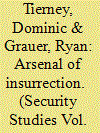| Srl | Item |
| 1 |
ID:
160237


|
|
|
|
|
| Summary/Abstract |
Recent scholarship has established several key dynamics in civil wars: since the nineteenth century, rebel victories have increased in likelihood; external support is one of the most significant predictors of rebel victory; and rebel groups have become increasingly likely to receive foreign backing. What is missing is an explanation of why patterns of third-party aid to rebels changed over time. Data on foreign assistance to rebels over the last two centuries reveals the odds of groups receiving aid increased from about one in five to about four in five. The nature of the patron also altered significantly, from great powers, to lesser states, and then nonstate actors. We explain these patterns using three variables: (1) great-power competition; (2) norms of national self-determination; and (3) globalization. This paper explores this theory with a case study of aid to rebel groups in Algeria since the 1830s.
|
|
|
|
|
|
|
|
|
|
|
|
|
|
|
|
| 2 |
ID:
160236


|
|
|
|
|
| Summary/Abstract |
Alliance politics are critical yet understudied in counterinsurgency interventions. Despite the importance of local allies, traditional research on alliances fails to account for the challenges of managing in-country counterinsurgency security partners or explain variation among which types of policy requests from large intervening allies are likely to result in compliance or defiance by local partners. When did US intervening forces have leverage in Iraq and Afghanistan, and when was American influence limited? Utilizing thousands of US government documents to analyze over 250 US demands of allies in Kabul and Baghdad, this paper reexamines established variables in the literature on inter-alliance bargaining—namely allied interests and dependencies—to offer a new model describing the interaction of these variables in asymmetric counterinsurgency partnerships. The theory predicts when large allies are likely to influence local partners and when these intervening forces will likely fail to coerce them.
|
|
|
|
|
|
|
|
|
|
|
|
|
|
|
|
| 3 |
ID:
160235


|
|
|
|
|
| Summary/Abstract |
This article examines the behaviors of political leaders who implement costly and risky measures during wars in which victory has become highly unlikely. It advances two related claims. First, counter to the prevailing logic, leaders with little to no culpability for starting a war remain susceptible to blame and domestic repercussions for how a war ends. Second, with these new leaders, the impetus to avoid blame can prompt risky behaviors that look like gambling for resurrection; but the underlying objectives differ. Through similar behaviors, new leaders do not necessarily hope to salvage victory but instead seek to simultaneously exhibit resolve and demonstrate the futility of further fighting, thus securing support for a less-than-favorable settlement while hedging against domestic punishment. To assess this “bleeding the army” logic as distinct from gambling for resurrection, the article looks at the case of the French Government of National Defense during the Franco-Prussian War.
|
|
|
|
|
|
|
|
|
|
|
|
|
|
|
|
| 4 |
ID:
160234


|
|
|
|
|
| Summary/Abstract |
Under which circumstances do soldiers and officers desert in a violent domestic conflict? This article studies individual military insubordination in the Syrian civil war, drawing on interviews with deserters from the Syrian army now based in Turkey, Jordan, and Lebanon. A plausibility probe of existing explanations reveals that desertion opportunities originating in conflict events and the presence of safe-havens fail to explain individual deserters' decision making. Accounting for socio-psychological factors—moral grievances and fear—generates more promising results for an inquiry into the conditions under which military personnel desert. While moral concerns with continued military service contribute to accumulating grievances among military members engaged in the civil war, fear—that is, soldiers' concerns for their own safety—is a more effective triggering cause of desertion. The article presents a theory-generating case study on the causes of military insubordination and disintegration during violent conflict.
|
|
|
|
|
|
|
|
|
|
|
|
|
|
|
|
| 5 |
ID:
160238


|
|
|
|
|
| Summary/Abstract |
This article examines the impact of the ethnic exclusiveness of regimes on commitment problems and hence on civil conflict duration. It argues that members of privileged in-groups in highly exclusive regimes can be trapped into compliance with the regime. Ethnic exclusion helps to construct privileged-group members as regime loyalists. They therefore fear rebel reprisals even if they surrender or defect and consequently persist in fighting. The article finds in particular that, in ethnically exclusive regimes, privileged-group members mistrust even rebels who mobilize on a nonethnic agenda and regard rebel reassurances, including nonethnic aims, as suspect. Exclusion therefore induces privileged-group cohesion, an effect more resistant to rebel reassurances than previously recognized. A case study of the Syrian civil war shows this dynamic at a micro level, and a cross-national statistical analysis gives partial evidence that it lengthens civil conflicts on a larg`e scale.
|
|
|
|
|
|
|
|
|
|
|
|
|
|
|
|
| 6 |
ID:
160239


|
|
|
|
|
| Summary/Abstract |
Diversionary conflict theorists assert that leaders can become more popular at home by pursuing conflict abroad. At first glance this claim appears counterintuitive in light of the hardship conflict often imposes on ordinary citizens. Relying on social identity theory (SIT), I deduce two hypotheses to help explain why conflict can increase popular support for leaders. First, conflict with an outgroup can make people identify more strongly with their ingroup. Second, stronger ingroup identification can lead to increased support for leaders inside the group. The second part of the article applies these two hypotheses to Russia's seizure of Crimea in early 2014. Attitude surveys show that the Crimea conflict increased national pride among Russians while support for President Vladimir Putin rose dramatically, and they suggest that the two processes were causally linked. These findings support the article's two hypotheses.
|
|
|
|
|
|
|
|
|
|
|
|
|
|
|
|